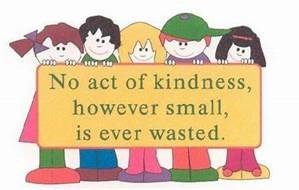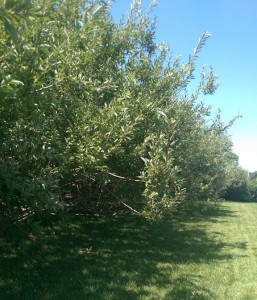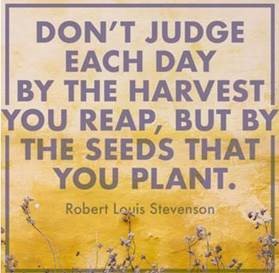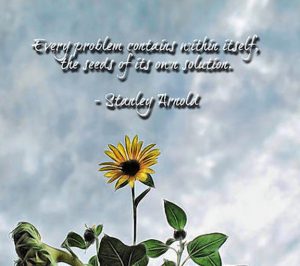All parts of this story are consolidated on one page here.
Lightning flashed again, dimly visible around the edges of heavy oak shutters. Ina, wide awake on a straw pallet in a corner of the small cabin, counted to six and then heard the distant rumble of thunder. The cabin’s other occupants all slept soundly—Nellie and her husband John, their daughter Mabel, and little Godfrey in his cradle.
Ina felt that she ought to be sleeping soundly too, after a long day of farm work. She had cleared weeds from row after row of corn and other crops, swinging a hoe till her hands got sore and blistered. Then, after lunch, she had filled a few baskets with early vegetables and sweet black raspberries before helping Nellie to cook and clean until dinner. She’d expected to be fast asleep by now—but instead, something called persistently to her. She felt it at the edge of her thoughts, an elemental energy as strong as the storm that had by now started spattering the cabin with loud, heavy raindrops.
What was out there in the storm, waiting for her? Ina couldn’t see much of her surroundings. The cabin had been dark since Nellie, while reciting a prayer for protection from evil spirits, had latched the shutters and barred the door before blowing out the candles—hours ago, it seemed like. Although Ina could hear the door and its thick wooden bar rattling in the gusty wind, she couldn’t make out the shapes.
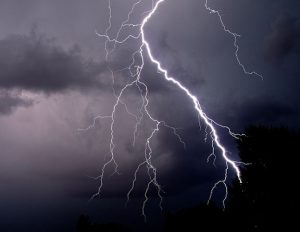
(Creative Commons image via flickr)
Light—she needed light to find her way. The next time the lightning flashed, and without thinking about it at all, Ina reached toward the shuttered window and caught the fading glow between her hands, like a child capturing a firefly. It flickered and then brightened, much as a candle would, when she opened her hands to let it hover above them. The tiny flame’s warmth felt good on her blistered palms—but no, there weren’t any blisters to be seen now. All at once, Ina’s hands had healed completely.
The flame rose higher and made a bobbing motion toward the door, like a playful puppy hoping to be taken for a walk. A memory teased at the back of Ina’s mind—it had something to do with a pet she’d once had, but it slipped away, elusive. The flame bobbed again, more insistently. Ina took a few steps toward the door and located her shoes, which were neatly lined up with the family’s shoes on a mat beside the wall, underneath some pegs from which hung thick cloaks.
A sense of being watched came into her awareness. Turning to her left, she found little Mabel standing in a nightgown, with wide eyes reflecting the supernatural glow.
“You’re a witch,” Mabel said softly, in a matter-of-fact voice that held neither question nor fear.
Ina turned the word over in her mind, letting it settle into the empty space where a now-distant identity once had been. It seemed like it fit reasonably well. “Yes, I suppose I must be,” she answered, in the same calm, descriptive tone.
Mabel glanced up at the hovering light, which had by now floated over to the door. Rain pounded steadily on the roof, but everyone else in the cabin still slept without stirring. “Can you teach me how to make witch-fire like that? It’s pretty.”
Putting on her shoes, Ina considered the question. Had she made the fire, or had she simply come upon it already existing in nature, waiting to be found? And was anything about it a skill that could be taught? She had no answers.
“I don’t think so, Mabel. It’s not something that I know how to teach.”
The little girl nodded as if she hadn’t expected anything more. “That’s all right. Mama probably wouldn’t want me to do it anyway. She says witches are evil. But the fire doesn’t look evil, and you don’t either—so maybe, sometimes, Mama could be wrong.”
“Maybe witches, like other people, are not all one thing or the other,” Ina suggested. She couldn’t feel anything evil in the magical firelight or in herself—but then, how would she know what evil felt like? It might seem okay at first glance, like a tree that looked healthy but had rot or insects hidden under the bark. She remembered ash trees dying from the borers, their dry bare branches outlined against a crisp, clear autumn sky. Where had that fragment of memory come from?
She wouldn’t find any answers here. It was time to get going.
Ina lifted the heavy bar, setting it carefully into its slot beside the door. The flame danced eagerly out into the storm when she opened the door a crack. The rain wasn’t dimming its light at all. Ina was about to follow when it occurred to her that Mabel wasn’t quite big enough to put the bar back across the door. She lifted the bar partway, told Mabel to hold it there for a moment, and pulled the door shut behind herself. Although she was instantly soaked through, the rain felt invigorating. The bar clattered into place, and Ina thought she heard a little voice saying “Bye,” as thunder boomed again.
The bobbing firelight already had moved several paces ahead of Ina, in the direction of the Wild Forest.
Click here to continue to Part 4.



